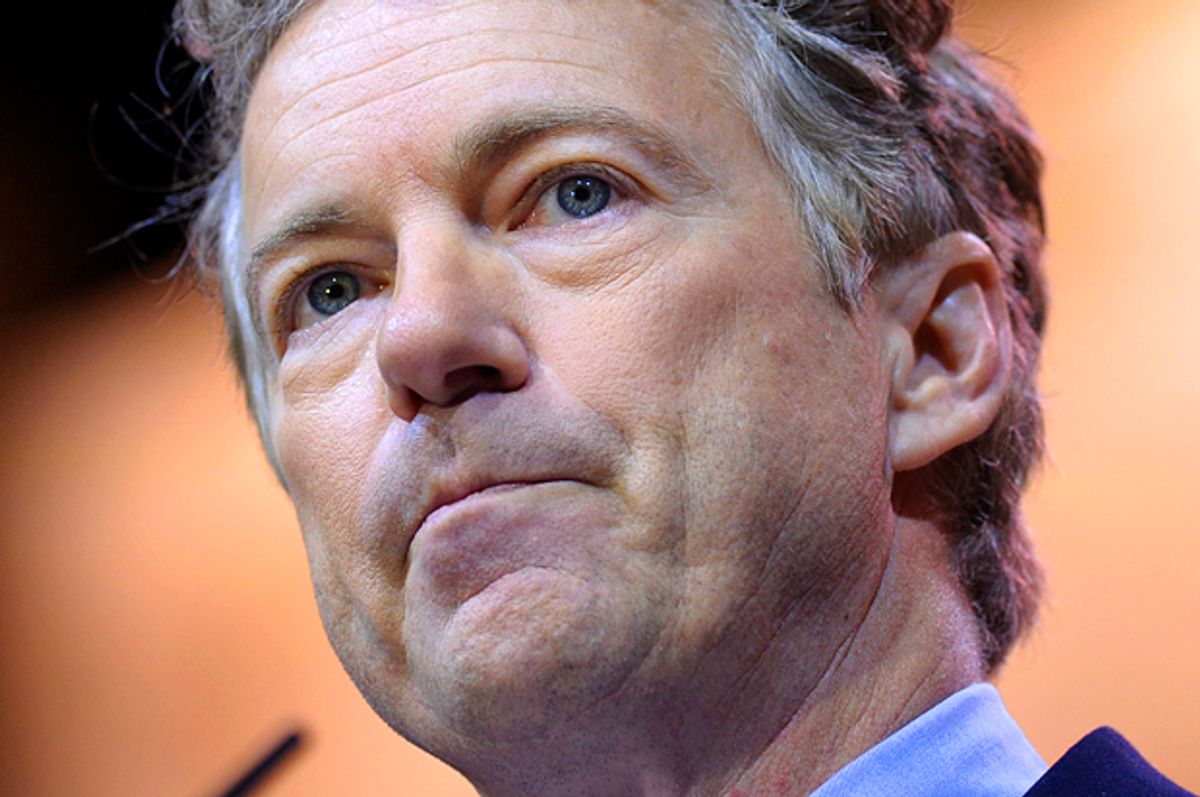Citizens United and subsequent court decisions loosening campaign finance restrictions have made running for president easy-peasy: you can find one billionaire to give you tens of millions of dollars and then you just do whatever they tell you to do. It's a great country. There are billionaires all over the place nowadays looking to purchase politicians for themselves.
And yet Rand Paul, who has a slender but not-nil chance of winning the Republican presidential nomination can't find himself a single willing billionaire into whose pockets he can dive deep. Tragically, this might mean that he'll have to raise money in the boring, old-timey horse-and-buggy fashion: by soliciting donations from a lot of people instead of one. Who wants this?
Politico reports that Paul's inability to secure a "sugar daddy" or two, so to speak, has "led to considerable frustration in his campaign, which, amid rising concerns that it will not be able to compete financially, finds itself leaning heavily on the network of small donors who powered his father’s insurgent White House bids." The obvious first choice was billionaire tech libertarian Peter Thiel, who gave Rand Paul's father a bunch of cash in 2012. Thiel is hesitant to play a similar role again for Ron's considerably more viable spawn, and staffers don't know why. Some suggest he's "become tired of political giving," which is understandable, because politics is bullshit and he could buy all other sorts of cool stuff with that money like boats and cars and things.
Sean Parker, the Napster cofounder who also made a bunch of money off of Facebook, was also solicited but may give his money to Hillary Clinton instead because his politics make no sense.
Larry Ellison's giving his money to Marco Rubio. So are a lot of rich people. Some "Miami auto dealer" is expected to give Rubio $10 million to $25 million. The car market is hot down there in Florida.
What about the Kochs? You know, the famous libertarian idealists Charles and David Koch. Alas, they did not like how Paul wore jeans to a summit they held earlier this year. They also want to go with a more likely winner, because instead of being libertarian idealists they're just big Republican donors who want a Republican in the White House to slash through a bunch of environmental regulations.
We empathize with Paul. It must suck to be a prominent Republican politician who can't get one measly billionaire to give him tens of millions of dollars.
The good news for Paul, though, is that he still has his last name. If he does need to rely primarily on the small(er) donor route, he's perfectly capable of that. All those people who gave money to and made comical blimp videos for his father are just waiting for their marching orders.
This might be a swell thing for Paul, then, if he stops trying to change the positions that made him a unique and interesting figure within the Republican Party in order to appeal to some dipshit CEOs by proving his mainstream appeal. As Politico writes, his stand against certain provisions in the PATRIOT Act -- a classic Paul issue -- was accompanied by many appeals to small donors for remuneration:
Paul is compensating by turning to his grass-roots supporters who fueled his national rise, bombarding them with pleas for cash. In recent days, many have highlighted Paul’s filibuster-style stand against the PATRIOT Act — opposition that has made him a hero to libertarians. “The clock is ticking,” read one appeal sent on Tuesday, a few days after his Senate theatrics. “I need to know you stand with me.”
The hope, those close to Paul say, is that his nationwide support from small contributors will make up for his billionaire deficit.
Paul's been consistent in his stand against reauthorization the PATRIOT Act throughout his career. But perhaps the need to fundraise from his activist base added a little more... spark... to his efforts. Annoying his fellow GOP senators, Paul refused to back down in his crusade against government surveillance this weekend, with sweeping NSA spying programs expiring at midnight today. And last week, Paul went directly after the hawks in his party for fueling the rise of ISIS.
Paul tried to go "mainstream" GOP in his foreign policy and none of the billionaires -- the BILLIONAYUHS, as Bernie Sanders would say, every third word -- would sign up. So now he's going back to the little people. Does this mean that Rand Paul might be a relatively interesting figure again, in the sense that he might have one or two heterodox positions within a field of 15 otherwise cookie-cutter candidates? Perhaps. And if the field is so crowded that a figure with ~15-20% of the vote can win numerous primaries, the strategy of appealing to a hardcore if narrow core of supporters can work better for him that it did for his father.

Shares